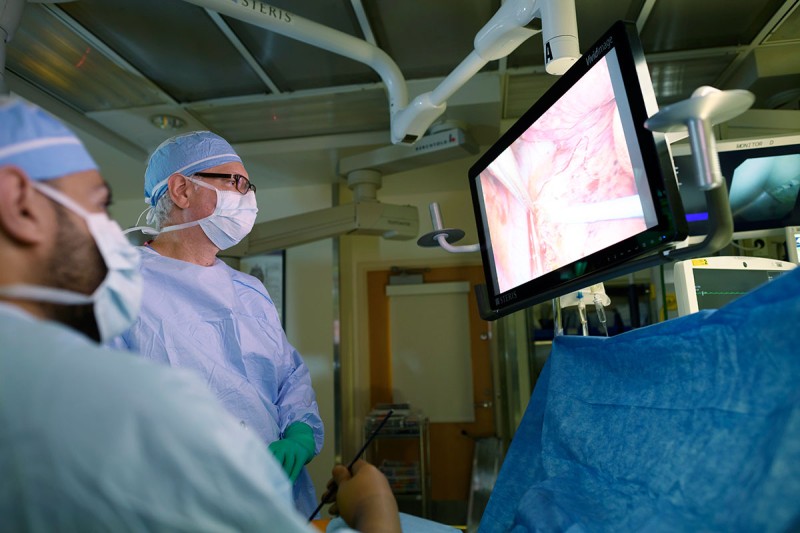
Tumor genomics and clinicopathologic features better predict recurrent lung adenocarcinoma (LUAD) following primary resection compared with the TNM classification system, according to a recent study from Memorial Sloan Kettering Cancer Center (MSK) published in JAMA Surgery. (1)
While genomic analysis using broad-based next-generation sequencing (NGS) has been utilized to guide therapeutic treatment for lung adenocarcinomas, opportunities to use NGS in earlier-stage, surgically resected LUAD have not been fully explored.
The goal of MSK’s research was to determine if a machine-learning prediction model integrating genomic and clinicopathologic features could better forecast risk of recurrence in patients with completely resected stages 1 to 3 LUAD compared with the TNM system.
“One of the biggest challenges we have with early-stage, surgically resected lung cancer is that even when you remove the tumor completely, the tumor can still come back,” says David R. Jones, Chief of the Thoracic Service in the Department of Surgery at MSK. Current TNM classification is helpful but does not perform well in identifying patients most at risk for developing recurrent disease. “This issue of recurrence is a big deal, even in patients who don’t have node-positive disease. Any additional information that could help us better predict recurrence would be very helpful for the individual patient.”
The study found that genomic alterations in SMARCA4 and TP53 were associated with decreased relapse-free survival. Common oncogenic driver genes associated with LUAD, including ALK, ROS1, BRAF, and KRAS, were not associated with recurrence. Integrating tumor genomics and key clinical features allows for a risk stratification and improved treatment protocol for patients with recurrent LUAD.
Key Study Findings and Implications
In this study, tumor genomic profiling using MSK-IMPACT® was performed on 426 patients with surgically resected primary stages 1 to 3 LUAD. MSK-IMPACT is a profiling mechanism for finding mutations that lead to certain types of cancers. This allows physicians to treat specific cancers and individualize therapies that will be most efficacious for the patients. MSK-IMPACT can be used on any tumor regardless of where the cancer started or metastasized to in the body.
Tumor genomic as well as specific clinicopathologic variables were analyzed using a machine-learning prediction model (PRecur) and externally validated using The Cancer Genome Atlas (TCGA). The prediction model outperformed the standard TNM-based model (concordance probability estimate, 0.73 versus 0.61) for prediction of relapse-free survival and was externally validated using TCGA data set.
“Integration of genomic and clinicopathologic factors may improve our ability to predict the risk of recurrence in surgically resected LUAD,” said Dr. Jones. “These findings suggest that using this predictive model approach can help us better identify patients at risk of recurrence as well as enrich and increase accrual to adjuvant-therapy clinical trials.” This will allow MSK physicians to better manage our patients, even when the surgery is successful. If risk of recurrence can be quantified, doctors can tailor surveillance and follow-up plans that are unique for each patient and specific to their cancer. Additionally, guidance on which clinical trial that patient would be most eligible for increases the chance of long-term survival.”
Clinical Trials Co-Investigated With Dr. Jones
- A Single-Arm, Open-Label, Phase I Trial to Assess the Safety of Genetically Engineered Autologous T Cells Targeting the Cell Surface Antigen Mesothelin with Cell-Intrinsic Checkpoint Inhibition in Patients with Mesothelioma (NCT04577326)
- A Phase III, Randomised, Controlled, Multi-centre, 3-Arm Study of Neoadjuvant Osimertinib as Monotherapy or in Combination with Chemotherapy versus Standard of Care Chemotherapy Alone for the Treatment of Patients with Epidermal Growth Factor Receptor Mutation Positive, Resectable Non-small Cell Lung Cancer (NeoADAURA) (WIRB) (NCT04351555)
- Phase 2 Trial of Neoadjuvant Nivolumab + Platinum-based chemotherapy + Certolizumab in Patients with Resectable Stages II-III Lung Cancers
Learn more about MSK’s Department of Surgery and Thoracic Surgery
Dr. Jones reported consulting for Merck & Co. and AstraZeneca.

